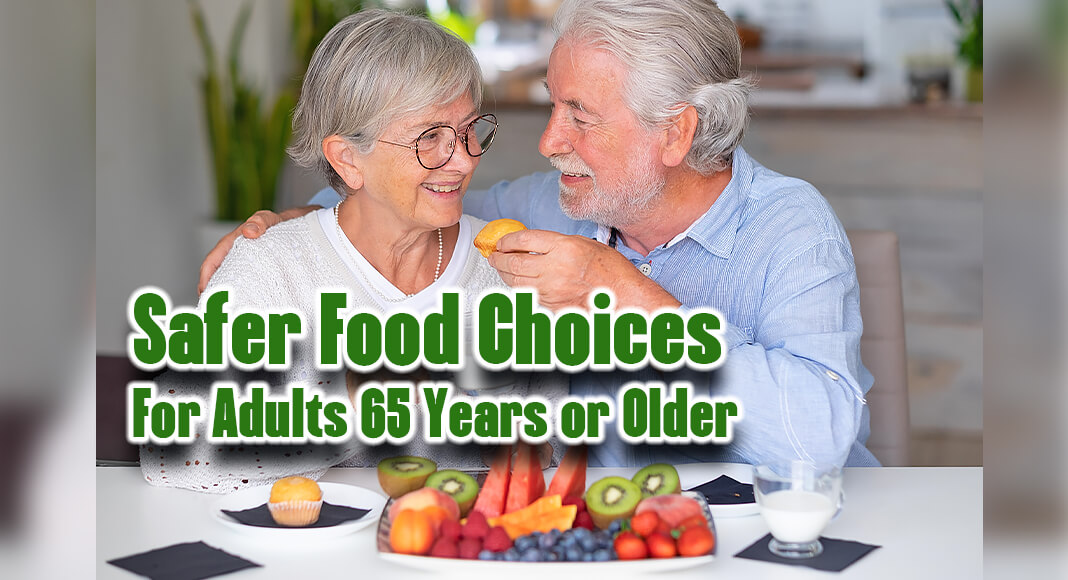
Mega Doctor News
Older adults have a higher risk of getting sick from food poisoning and having a more serious illness.
To prevent food poisoning, some foods are safer choices than others. That’s because some foods—such as undercooked meat and eggs, unwashed fruits and vegetables, and unpasteurized milk — are more often associated with foodborne illnesses. Use the table below as a guide to safer food choices.
Poultry and Meat
Riskier Choice
- Raw or undercooked poultry or meat
- Poultry includes chicken and turkey
- Meat includes beef, pork, lamb, and veal
- Unheated deli meat, cold cuts, hot dogs, and fermented or dry sausages
- Refrigerated pâté or meat spreads
Safer Choice
- Poultry and meat cooked to a safe internal temperature. Use a food thermometer to check.
- All poultry, including ground chicken and turkey, cooked to 165°F
- Whole cuts of beef, veal, lamb, and pork cooked to 145°F (then allow the meat to rest for 3 minutes before carving or eating)
- Ground meats, such as beef and pork, cooked to 160°F
- Deli meat, cold cuts, hot dogs, and fermented or dry sausages heated to 165°F or until steaming hot
- Pâté or meat spreads in sealed, airtight containers that don’t need to be kept refrigerated before opening
Deli salads
Riskier Choice
Premade deli salads, such as:
- coleslaw
- potato salad
- tuna salad
- chicken salad
- egg salad
Safer Choice
- Homemade deli salads
Fruits and Vegetables
Riskier Choice
- Any raw or undercooked sprouts, such as alfalfa and bean
- Unwashed fresh fruits and vegetables, including lettuce and other leafy greens
- Cut melon left out for more than 2 hours (1 hour if it’s exposed to temperatures hotter than 90°F, such as a picnic or hot car)
Safer Choice
- Cooked sprouts
- Washed vegetables and fruits (washed and then cooked are safest)
- Freshly cut melon or cut melon kept refrigerated for 7 or fewer days
Juice
Riskier Choice
Unpasteurized juice or cider
Safer Choice
- Pasteurized juice or cider
- Unpasteurized juice or cider brought to a rolling boil at least 1 minute before drinking
Milk
Riskier Choice
Unpasteurized (raw) milk, and dairy products made from unpasteurized milk
Safer Choice
Pasteurized milk, and dairy products made from pasteurized milk
Cheese
Riskier Choice
- Soft cheese made from unpasteurized (raw) milk— for example, queso fresco, brie, camembert, and blue-veined cheese
- Unheated cheese sliced at a deli
Safer Choice
- Hard cheese, such as cheddar and swiss
- Cottage cheese, cream cheese, string cheese, and feta
- Pasteurized soft cheeses heated to an internal temperature of 165°F or until steaming hot
- Deli-sliced cheeses heated to 165°F or until steaming hot
Eggs
Riskier Choice
Raw or undercooked (runny) eggs, and foods that contain raw or undercooked eggs, such as
- Caesar salad dressing
- Raw cookie dough
- Eggnog
Safer Choice
- Eggs cooked until the yolks and whites are firm
- Egg dishes (frittata, quiche, casserole) cooked to an internal temperature of 165°F if they contain meat or poultry
- Egg dishes cooked to an internal temperature of 160°F if they do not contain meat or poultry
- Pasteurized eggs in foods that will not be cooked to a safe temperature, such as mousse and salad dressing
Fish
Riskier Choice
- aw or undercooked fish or shellfish, including sashimi, sushi, and ceviche
- Refrigerated smoked seafood (except in a cooked dish). Refrigerated smoked seafood is usually labeled as “nova-style,” “lox,” “kippered,” “smoked,” or “jerky”
Safer Choice
- Fish cooked to a safe internal temperature of 145°F or until the flesh is opaque and separates easily with a fork
- Shellfish cooked until shells open during cooking or until flesh is pearly or white, and opaque
- Smoked fish in sealed, airtight packages or containers that don’t need to be kept refrigerated before opening
- Smoked fish cooked in a casserole or other cooked dishes
- Canned fish and seafood
Flour
Riskier Choice
Raw dough or raw batter made with raw (uncooked) flour
Safer Choice
- Food made with flour that is cooked following the package directions or recipe
- Dough and batter made with heat-treated flour and pasteurized eggs
- Dough and batter that is labeled “edible” or “safe to eat raw”
Select the image below and print for your own personal reference:
Always follow the four steps to food safety—clean, separate, cook, and chill—to protect yourself from food poisoning.
Learn about current foodborne outbreaks and the foods linked to them.
Information Source: CDC










